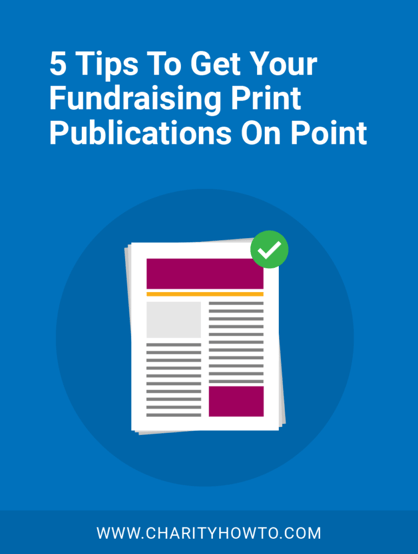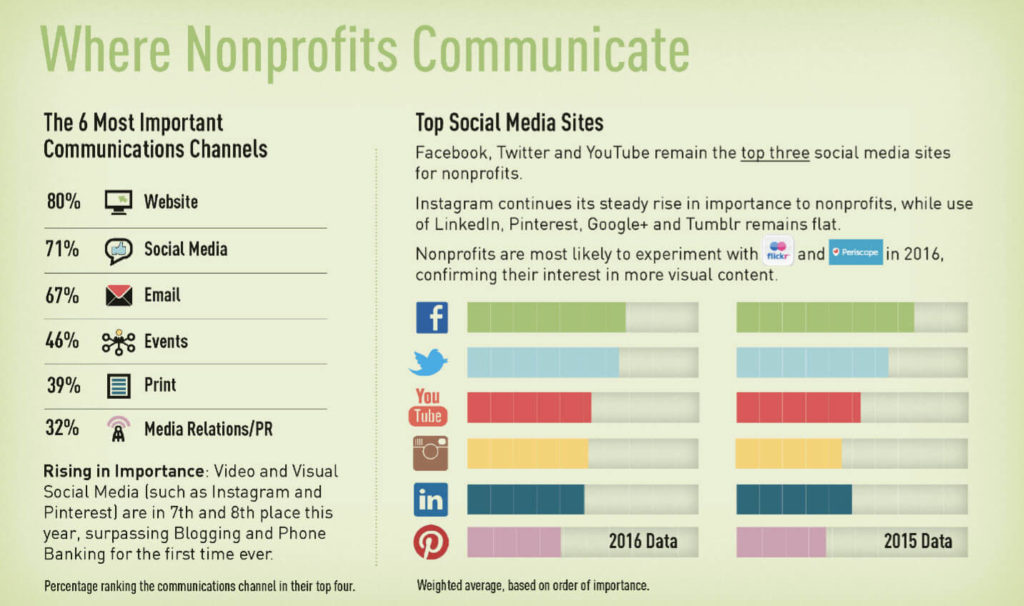Blog Post by Heather Stombaugh

Strategies and tactics in fundraising may change, but print publications continue to be a critical resource in the nonprofit toolbox. According to Kivi Leroux Miller’s 2016 Nonprofit Communication Trends report, print remains one of the top five most important communication channels in the nonprofit sector.
Image Credit: Kivi Leroux Miller
Every nonprofit should invest in creating compelling fundraising publications. However, in the tumult of other pressing needs, many small nonprofits put off developing their annual reports, cases for support, and other collateral to save money. Let me put this simply: in ANY business, you must spend money to make money. Nonprofits are businesses; ergo, nonprofits need to spend money to raise money.
I hear you now: “That is all fine and good, Heather, but let’s live in reality. We do not have the money or the staff or the time or the expertise to do print publications.” But you do and you can, because you must. You do not have to hire a big consulting firm to make a great publication. You can do it with existing resources—including your Board and volunteers—if you focus on best practices and follow these five tips.
1. Define your expectations in writing.
I use a questionnaire to start any publication project. I ask lots of questions of the nonprofit, like:
- What is the purpose of your publication? Why is this effort important?
- Who is your primary target audience? Secondary audiences?
- What is your fundraising goal(s), in $$, related to the purpose?
- Who is the project lead (one point of contact only)?
- Who are your internal decision-makers (i.e. who has the authority to approve proofs)?
- What channels do you currently use to communicate with your current and potential donors?
- What is the geographic scope of the fundraising effort?
- If people could use only three words to describe your organization, what would you want those three words to be? (ex. conservative, progressive, friendly, casual, professional)
- What three words describe how you do NOT want to be perceived in the community?
- What collateral have you published recently? Which is your favorite?
- Does your organization have a style guide or do you reference a major style guide as a standard (AP, Chicago, etc.)?
- How do you plan to distribute your publication?
- What’s your print budget?
- What is the deadline to go to print?
2. Use a team approach.
Fundraising publications are of the highest quality when more than one brain or set of eyes is involved. Gather a team together and identify a project leader. (That could be you.) Delegate tasks, and serve as the hub of all the work that goes into the publication. Work with other staff and volunteers to get it done. #ProTip: Find a friendly graphic designer who may be willing to donate some or all her time to the project. Moreover, did you know some graphic designers specialize in the nonprofit sector? They are out there if you look!
Fundraising publications are of the highest quality when more than one brain or set of eyes is involved. Gather a team together and identify a project leader. (That could be you.)
Delegate tasks, and serve as the hub of all the work that goes into the publication. Work with other staff and volunteers to get it done.
#ProTip: Find a friendly graphic designer who may be willing to donate some or all her time to the project. Moreover, did you know some graphic designers specialize in the nonprofit sector? They are out there if you look!
3. Allow adequate time for the project.
Publications should not be thrown together in haste. That leads to mistakes and missed opportunities. Writing and design are creative processes that require a reasonable time investment. Do not give burden yourself unnecessarily by trying write, design, print, and mail, for example, an invitation in the space of one day.
You can have publications good, fast, or cheap. Pick two, but you cannot have all three.

4. Print your publications with a vendor.
I am realistic about budgets, and you can get away with printing some publications on your desktop printer (like invitations to less formal events). However, for publications like cases for support or annual reports, work with a print vendor. Digital printing is a more affordable option than traditional printing on presses, and the quality of digital printing is just as good as traditional printing (which was not always the case). Do you want to spend all that effort on creating a beautiful publication only to print it on your desktop printer and have it look unprofessional?
5. Set a deadline for final changes.
If at the last minute, you discover a donor’s name is misspelled in the annual report, that is a simple fix. However, if at the 11th hour you decide you want to change the design or copy of an entire page, you are in for a world of issues: that is not a quick fix and will affect the flow of the entire publication. Plan for multiple stages of editing and proofing (including a formal final review), but be reasonable. If you are not, the revisions will never stop. Set and stick to your publication schedule.
How do you stay on time, track, and budget with your fundraising publications?
Are You Ready to Create Your Powerful Case for Support?
Check out all CharityHowTo webinars on nonprofit fundraising.
You will learn proven practices and strategies to create a compelling and powerful Case for Support for your nonprofit. Through the Case for Support, you engage donors—new and potential—through your credibility, data, and consumers’ stories. The Case helps you motivate donors to give by using storytelling and graphics.
About The Author
Heather Stombaugh is a nonprofit expert with more than 16 years of experience in leadership, programs, and fundraising. She is the founder of JustWrite Solutions, a national nonprofit consulting firm.
She serves as an expert for CharityHowTo, CharityChannel, and Thompson Interactive. Heather is an officer of local and national boards (Grant Professionals Foundation, Baskets of Care, AFP Northwest Ohio) and an active member of the Grant Professionals Association (GPA Weekly Grant News Editor and Approved Trainer).
She is one of fewer than 50 people in the world who holds both the GPC and CFRE. Heather lives and breathes nonprofits!
This blog was influenced by an original blog post, Pain-Free Publications, by Ericka Kurtz of JustWrite Solutions.

